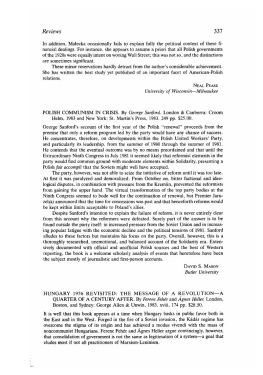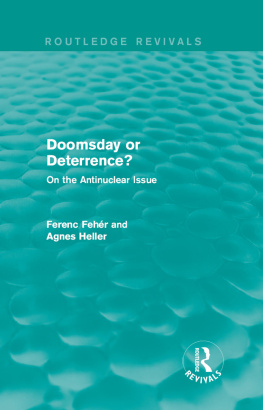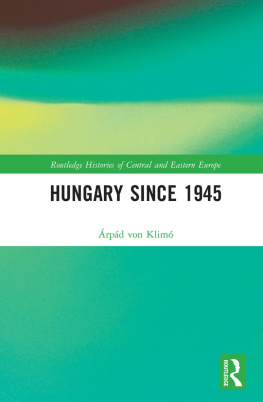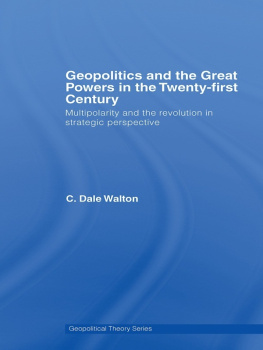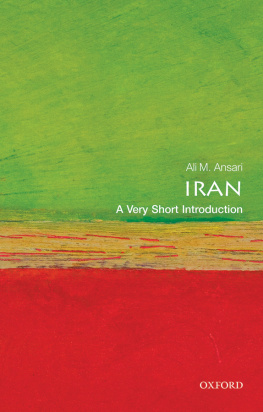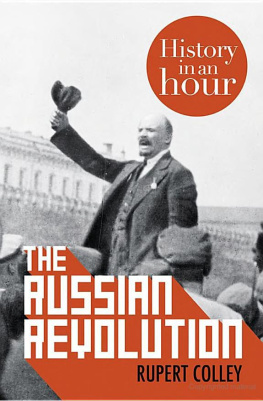REVOLUTION
Volume 14
HUNGARY 1956 REVISITED
HUNGARY 1956 REVISITED The Message of a Revolution A Quarter of a Century After
FERENC FEHR AGNES HELLER
First published in 1983 by George Allen & Unwin Ltd
This edition first published in 2022
by Routledge
4 Park Square, Milton Park, Abingdon, Oxon OX14 4RN
and by Routledge
605 Third Avenue, New York, NY 10158
Routledge is an imprint of the Taylor & Francis Group, an informa business
1983 Ferenc Fehr and Agnes Heller
All rights reserved. No part of this book may be reprinted or reproduced or utilised in any form or by any electronic, mechanical, or other means, now known or hereafter invented, including photocopying and recording, or in any information storage or retrieval system, without permission in writing from the publishers.
Trademark notice: Product or corporate names may be trademarks or registered trademarks, and are used only for identification and explanation without intent to infringe.
British Library Cataloguing in Publication Data
A catalogue record for this book is available from the British Library
ISBN: 978-1-032-12623-4 (Set)
ISBN: 978-1-003-26095-0 (Set) (ebk)
ISBN: 978-1-032-14698-0 (Volume 14) (hbk)
ISBN: 978-1-032-14701-7 (Volume 14) (pbk)
ISBN: 978-1-003-24061-7 (Volume 14) (ebk)
DOI: 10.4324/9781003240617
Publishers Note
The publisher has gone to great lengths to ensure the quality of this reprint but points out that some imperfections in the original copies may be apparent.
Disclaimer
The publisher has made every effort to trace copyright holders and would welcome correspondence from those they have been unable to trace.
As with the Czechoslovakia of 1968 and the Poland of 1981, the eyes of the world were on the Hungary of October-November 1956. The Hungarian Revolution was a turning-point, a lost opportunity for world change. Tragically, criminally perhaps, it showed the West prepared to respect the unprincipled provisions of the Yalta-Potsdam agreements. And three years after Stalins physical death, it signalled the political death of the particular form of communism he had imposed on Eastern Europe in the late 1950s.
Hungary 1956 Revisited is not a descriptive chronicle of events; there are many of these. It is a radical reinterpretation of the Revolution in the context of world politics and Eastern Europe as a whole. It is radical in a double sense. It reveals totally new features and angles on an event which went beyond the simple question of a people having had enough of communism. Brand-new protagonists appear on the scene: General Serov, the first head of the KGB, Ambassador Andropov who started his career in beleaguered Budapest, Istvan Bibo, the great non-doctrinaire socialist and architect of a new consensus. Old acquaintances appear: the martyr of the Revolution Imre Nagy, the first Eurocommunist, who returned usurped power to his people - and the favourite of the Western Press, the liberal Janos Kadar who betrayed and crushed the Revolution and gave at least his name to the reprisals.
At the same time, Fehr and Heller are radical in the other sense that they write from a resolutely Leftist position, relying on witnesses and participants for their rigorous documentary backing. Theirs is a passionate polemic, written with commitment to the greatest workers uprising of post-war Europe. Theirs is a condemnation both of the West in 1956, and of Kadars Hungary today - a regime which they insist has merely been consolidated, never legitimised.
Agnes Heller and Ferenc Fehr left Hungary in 1977, after a long record of dissidence. Agnes Heller is presently Reader in Sociology at La Trobe University, Melbourne, Australia. Both she and Ferenc Fehr are authors or joint authors of a number of books on socialism and socialist society.
Hungary 1956 Revisited The Message of a Revolution a Quarter of a Century After
Ferenc Fehr and Agnes Heller
Ferenc Fehr and Agnes Heller, 1983.
This book is copyright under the Berne Convention. No reproduction without permission. All rights reserved.
George Allen & Unwin (Publishers) Ltd,
40 Museum Street, London WC1A 1LU, UK
George Allen & Unwin (Publishers) Ltd,
Park Lane, Hemel Hempstead, Herts HP2 4TE, UK
Allen & Unwin, Inc.,
9 Winchester Terrace, Winchester, Mass. 01890, USA
George Allen & Unwin Australia Pty Ltd,
8 Napier Street, North Sydney, NSW 2060, Australia
First published in 1983.
British Library Cataloguing in Pabttcation Data
Fehr, Ferenc
Hungary 1956 revisited.
1. HungaryHistoryRevolution, 1956-
2. HungaryPolitics and government1945-
I. Title . Heller, Agnes
943.9052 DB957
ISBN 0-04-321031-7
Library of Congress Cataloging in Pabttcation Data
Fehr, Ferenc, 1933-
Hungary 1956 revisited.
Includes index.
1. HungaryHistoryRevolution, 1956. 2. HungaryHistory Revolution, 1956Influence. 3. Europe, EasternPolitics and government1945-. 5. World politics1955-1965.1. Heller, Agnes. II. Title.
DB957.F42 1983 943.9 052 83-10577
ISBN 0-04-321031-7
Set in 11 on 12 point Plantin by Bedford Typesetters Ltd,
and printed in Great Britain
by Billing and Sons Ltd, London and Worcester
Contents
Preface
Acknowledgements
2 The Impact on Hungary
(i) The Hungarian Revolution: A Simple Matter?
(ii) Was the Revolution Necessary?
(iii) The New Republic
(iv) Imre Nagy: A Kerensky in Reverse, an Inconsistent Bolshevik, or a New Type of Socialist Radical?
(v) Violence in the Revolution
(vi) Kdrist Hungary: The Product of a Crushed Revolution
Notes: Chapter 2
Dedicated to the memory of the victims
Preface
Generally speaking, adding any kind of preface to a book is a questionable practice - at least, any preface which contains more than technical information or acknowledgements. Anything else would seem to be a futile attempt to apologise for this or that feature of the text which, if it does not stand on its own, cannot in any case be protected by a preface. But in this particular case certain aspects of our presentation of the Hungarian revolution need some introduction.
First of all, we should like to dispel any appearance of Hungarian nationalism and a hypertrophy of Hungarian self-advertisement. True, we have stated repeatedly and from several viewpoints in this book that Hungary in 1956 played a world-historical role. The Hungarian revolution was the first to assault the unjust and oppressive world-system created by the signatories to the Yalta and Potsdam agreements. It was the Hungarian revolution that taught the lesson, after too long a period of belief to the contrary, that a totalitarian regime can be toppled from within. Hungary in 1956 and her revolution put an end to the illusion of the Popular Front policy. The Hungarian revolution triggered the exodus of the communist intellectuals from their parties.
Is to say all this to say too much? Is this a fair description of the events within the limits of realistic assessment? There is an undeniable tendency in many (if not all) individuals to aggrandise the events of their own lives. Similarly, there is a tendency in the members of most (if not all) national communities to assign an exaggerated importance to everything that happens to them, while we have to admit that objectively there are in fact very few national communities in history whose life processes exert continuous impact on humankind as a whole. Let us set the record straight at this crucial point: we have never entertained illusions regarding such a

